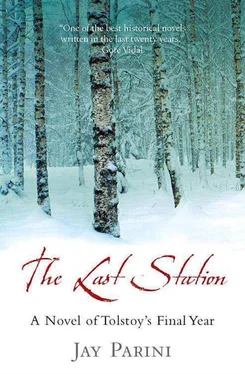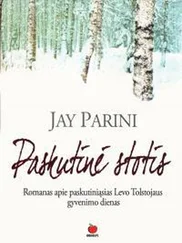‘That is pure, foolish nonsense,’ I said. ‘We have had some disagreements, but they are no more than any married couple experiences. I love you.’
I probably should have said nothing. It is sometimes best to ignore his facetious prattling.
‘You and I no longer agree on anything: neither the land question nor the religious question.’
‘We are not heads of competing states,’ I said. ‘We are man and wife. Do we have to agree on such questions?’
‘The life I lead is an embarrassment to me and my friends. I am a hypocrite.’
‘You don’t mean a word of that, Lyovochka. That is Chertkov speaking. You are not yourself tonight.’
‘I don’t know how I can continue.’ His lips trembled as he spoke. I knew it was true.
‘Do you love me?’ I reached out for his wrinkled hand. It was as cold as marble, and as veined.
‘I have never not loved you.’
‘Come, Lyovochka,’ I said. ‘You fill your head with nonsense. Do your duty. God asks nothing more of you. Your duty is, first, to respect your family. There are obligations that come before selfish whims. All you can think about is yourself, did you know that?’
He covered his face with his hands and wept, his shoulders shaking. He seemed like a young child, suddenly, so helpless and without control. It was pitiful. I found myself, to my amazement, weeping, too. We each cried on the other’s shoulder.
‘There now,’ I said. ‘It’s not so bad, is it?’
He stared at me, his eyes hollow, red as coals. He shook his head. ‘It will never work,’ he said. ‘I cannot continue.’
Slowly, he composed himself and left the room. I said nothing.
I no longer understand my life. I want to die.
I think I could easily have stayed in the Crimea, living beside Varvara Mikhailovna. I had a dream there in which her head was deep in my lap as we lay beside the water, a salt green sea, with waves splattering over low rocks. One night, past midnight, I walked in the fields with her, a hot wind filling our heads, our lungs. The stars fell like snowflakes in the high grass. I told her about my dream, and she hugged me, and we wept. We lay in the grass, shawls drawn up about our shoulders, and slept. When dawn broke the horizon was pink as flesh, a faint wind stirring the field like froth. I was happy.
As the weeks turned, we grew brown in the sun. Our hair cut short like boys’, we ran in the sandy woods near the big house that Count Minsky had loaned to us. It was full of servants, and the samovar was never empty or cool. We drank wine, too, a light Bordeaux stored in the count’s cellar. It made us feel naughty and giddy.
I recovered my strength as the fever passed. My throat cleared, and my head no longer throbbed. I felt whole again, especially with Varvara beside me. I felt released from a terrible but invisible enclosure.
At Yasnaya Polyana, she would never have felt free to sleep beside me, but there it seemed perfectly natural. Varvara had been sent to look after me, hadn’t she? Young girls – children, really – will often sleep together. I daresay it was childish of us. But we enjoyed the silliness. I do not know what Count Minsky’s servants thought, but I did not ask.
When I was still suffering from fever, Varvara rubbed my back with alcohol each night before I slept. We soon realized that, even without a fever, back rubbing is a pleasurable activity. I would undress slowly by the fire as it sputtered in the black grate and flickered against the white walls with Varvara watching, nodding, and occasionally smiling. She would hum quietly or, sometimes, sing a Bulgarian folk tune that she loves about two young girls in a field.
Naked, I would walk to the bed and lie on the cool, puffy quilt. It chilled my body, but Varvara’s hands were silky and warm. She has a lovely way of kneading the flesh, of finding the muscles to the left and right of the spinal column, of touching a hidden crevice between the vertebrae. She would work the soft flesh of my buttocks, take one thigh, then the other, in her large hands. Her fingers, pressing, seemed to enter my anklebones, to penetrate my arches.
After a long massage, she would collapse beside me and pull the red-and-green patchwork quilt over our heads. We would fall asleep in a short time – a dreamless, wordless sleep in a bed so large it might have been an arctic snowfield (except for the fire between us).
I would have stayed longer if I had not been worried about Papa. I missed him badly, more than I’d have guessed. And he cannot cope easily with Mama, who has grown worse over the years. With reluctance, we went back to Yasnaya Polyana toward the end of May.
Papa had returned the week before from Kochety, where he’d met with Chertkov. He is always buoyant when he has seen or is about to see Chertkov. He loves Vladimir Grigorevich as I love Varvara Mikhailovna. I would never begrudge him this.
Despite Mama, my return home was exhilarating. Papa wept when I came through the door, embracing me for such a long time. He never used to weep so easily. I was afraid for him.
He could think about nothing but going to Chertkov’s house at Meshcherskoye in two weeks. Chertkov insists that he continue to ride, but Mama invariably tries to stop him. He wants to think, Papa says. ‘Think about what?’ she asks. ‘Why can’t you think in your house, like everyone else?’ We all laugh, except Mama.
I was typing some letters for Papa a few days ago when Mama came barging into the room without knocking.
‘Here I am,’ she said, ‘an outcast in my own home.’
I refused to respond.
‘Nobody seems to care that I am sixty-six years old,’ she continued. ‘A woman of sixty-six cannot look after this estate. Do you hear me? I’m run ragged. I have no time for myself!’ Her whining voice rose to a most unattractive pitch. ‘I cannot manage it any longer! Don’t you see that? Can’t anyone hear what I’m trying to say?’
‘So who is asking you to do it?’ came a voice in the doorway. It was Papa, grizzly and wild. His eyes sputtered like coals stirred by a poker.
‘You hate me, don’t you? Tell the truth,’ she said. ‘In front of your daughter, in God’s sight, say exactly what is true!’
The light went out in Papa’s eyes, and his whole being sagged. ‘Go away from here, Sonya. Your nerves will ruin you if you don’t. Dushan thinks you need a period of rest.’ He turned to me. ‘Tell her, Sasha, how the Crimea helped.’
I tried to echo his sentiments, but Mama broke in.
‘You’d like nothing better than to drive me away. You want to get rid of me. That’s all you can think of.’
Papa looked disconsolate. ‘You always think the worst of me, don’t you?’
‘I know exactly what to think of you. I think what is true. I’m not ignorant, though you and your friends haven’t quite understood that.’
‘You’re mad,’ he said, and walked away, fuming.
The next day another incident occurred that points up the difference between my parents. Last year Mama hired a young Circassian guard, Akhmet, to protect our property. Everyone knows that Leo Tolstoy lives here, that he is wealthy and generous. Beggars, revolutionaries, students, monks and visionaries, crooks – they all descend on us, and we do need protection of a sort. But Papa hates the sight of Akhmet, who takes his job too seriously and struts about the grounds in a formal black tunic with a sword at his side. He insists on wearing a pompous Persian-lamb cap, which he tilts to one side as if to taunt us. He refuses to let strangers ‘wander about the Master’s property,’ as he puts it. They daren’t even pick wildflowers in Zasyeka Wood.
The man is brutish. I heard from Sergeyenko, in fact, that he has actually molested married women in the village.
Читать дальше












